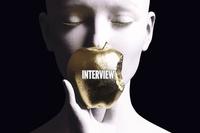Many separating veterans aren't accustomed to the rigors of the job interview process. Most who leave the military will be looking for work in a skilled job as a civilian for the first time ever.
After creating a tight, relevant resume and rounding up the want ads that best fit their career goals, vets will likely score a number of interviews -- and still not get the job.
This can not only be confusing, but it also makes it difficult to plan a protracted job search.
While no one should wait around for a callback from any given interview, interviewing for a dream job may make a job seeker take pause if they don't get an offer. Here are a few things to look for in the interview that may mean you aren't ever getting that callback.
1. Eye Contact (or the Lack Thereof)
Sometimes, an interviewee just doesn't stand a chance. There could be a number of reasons for this. The job might have to be listed publicly for a set period of time, or they hired internally and interviewing outsiders has become a formality. But the interviewee isn't getting hired, and the interviewer knows it.
If the interviewer can't seem to make a personal connection via eye contact, it may be because they feel bad for someone who got all dressed up and excited for nothing. It could also mean they know it isn't important to register important information about the person they're interviewing, so the meeting will be forgotten as soon as the interviewee leaves. Either way, the end result is the same.
2. They Don't Actually Ask Any Relevant Questions
A job interview is about meeting the person behind the resume and going in-depth about how their experience can fit the role for which they've applied. Naturally, one would expect the interviewer to ask a candidate about those experiences and the context in which the skills acquired in the role could be useful to the new company.
If the interviewer just makes small talk and doesn't really go in-depth about a candidate's job experience, skills or education, that's a bad sign.
3. They Clearly Haven't Read Your Resume
Again, the expectation of a job interview is to go in-depth about a person's relevant work experience and/or education. A hiring manager who's serious about finding the right candidate for the open position (and they are always serious about that) will have vetted the resumes for candidates being interviewed that day.
When the conversation only ever touches on the resume or basically results in the candidate reading the resume to the interviewer, it's a sign that the person interviewing either isn't someone who can move the candidate forward, isn't serious about the interview (for many reasons), the interview is meant to "check a box" or any of those possibilities. A serious interview goes further than what can be read on a resume.
4. The Interviewer's Demeanor Changes Mid-Interview
Imagine sitting in a job interview where everything is going very well. There is a good, steady dialogue about relevant experience, the mission of the company and how well you fit into the culture. Then, any number of disruptors occur: You answer a question in a way that surprises the interviewer, maybe another hiring manager joins the interview or the interviewer steps out of the room for a few minutes.
After that, everything changes. The interviewer may become hostile, try to push you away from being interested in the job or just become closed off altogether.
What went wrong? Likely, you won't know. Hiring managers across internet message boards remind us that someone's status in the candidate rankings can change throughout the interview or the entire hiring process. If you feel like something's gone awry, you're probably right.
5. How the Interview Ends
In many successful job interviews where the candidate was selected for the position, the hiring manager gave the candidate a tour of the office and perhaps introductions to the management and their would-be new co-workers. This isn't always what happens, but it's a sign that things went well.
However, when the interview ends with something like, "We are still interviewing. We will let you know," that's the job interview equivalent of, "Don't call us; we'll call you."
An even worse sign is if they end the interview early.
What Now?
While these are harbingers of doom, they don't always mean the candidate won't get the job or won't make it to the next interview cycle -- but it sure doesn't look good. Ending the interview early could mean they've heard all they need to hear. Not making eye contact could just be the way an interviewer conducts interviews.
What's important is that you still do everything expected of a potential candidate. Be thoughtful and send a note of thanks. Follow up, if possible, and offer to clarify any outstanding questions. Don't get hostile toward the company or interviewer.
Most importantly, remember: This will not be the only interview you get, and the next one could be much better.
-- Blake Stilwell can be reached at blake.stilwell@military.com. He can also be found on Twitter @blakestilwell or on Facebook.
Want to Know More About Veteran Jobs?
Be sure to get the latest news about post-military careers as well as critical info about veteran jobs and all the benefits of service. Subscribe to Military.com and receive customized updates delivered straight to your inbox.












